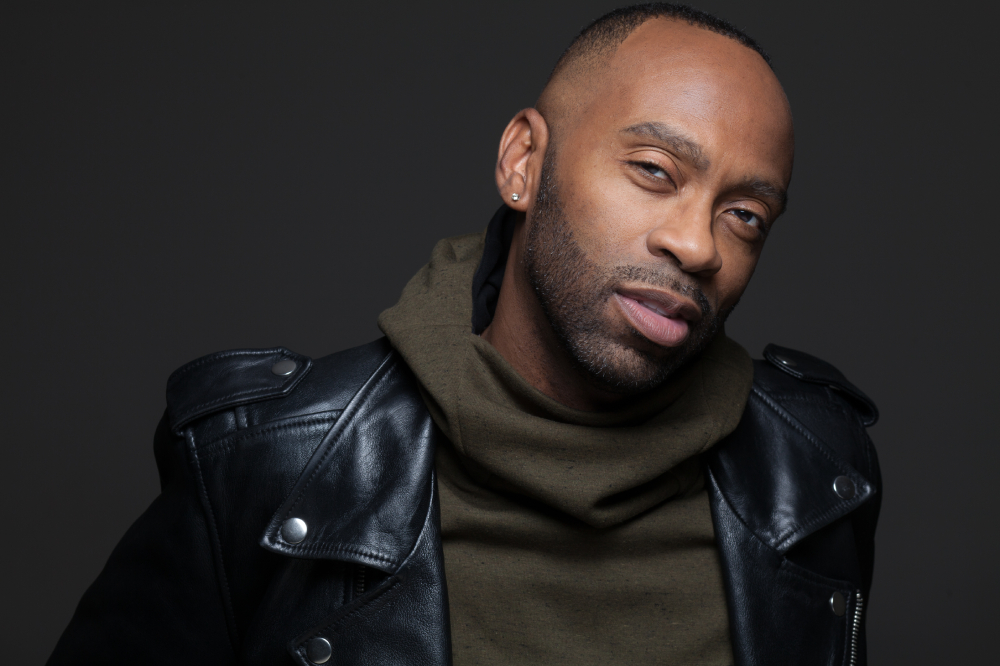Culture
 Steve H. Broadnax III. Photo by Lelund Thompson.
Steve H. Broadnax III. Photo by Lelund Thompson.
A Conversation with Broadway Director Steve H. Broadnax III
June 30, 2022 @ 9:00am
Led by Broadway director Steve H. Broadnax III, Studio Theatre’s production of Katori Hall’s Pulitzer-Prize-winning play “The Hot Wing King,” explores themes that correlate with the director’s personal journey towards redefining what it means to be a man.
“This play is about love — unconditional love prevails all,” says Broadnax, who made his Broadway directorial debut in 2021 directing Keenan Scott II’s “Thoughts of a Colored Man,” which, like “The Hot Wing King,” depicts portions of the Black male experience in America.
“Even though many Black men have not been taught how to love outside of the restraints of masculinity, in this play, we get to see these men surrender to the power of love and witness its healing effects.”
“The Hot Wing King” is a portrait of the modern, but often underrepresented, American family. The play follows a team of Black, predominantly gay Memphis men, whose quest for a local hot wing competition championship gets interrupted by the arrival of a nephew in need of care.
In 2016, while directing Katori Hall’s Olivier-Award-winning drama, “Mountaintop,” at People’s Light in Pennsylvania, Broadnax and Hall shared an intimate conversation that would later birth “The Hot Wing King.” Over a quick McDonald’s breakfast before rehearsal, Hall shared a story of her brother and his same-gender partner. She explained that the couple had recently taken in their teenage nephew, despite doubts from the boy’s incarcerated father of whether a heterosexual boy could be guided into manhood by two gay men.
“I said, ‘Katori — that’s your next play,’” Broadnax says, who also serves as an associate professor of theatre and professor in charge of MFA acting at Penn State University. “I’ve never seen that dynamic onstage before, but we need that in our community to understand this new sense of family.”
Hall agreed, but the play took about three years and countless check-ins by Broadnax to be produced. Hall’s career took off, as Starz tapped her to executive produce their new series “P-Valley,” adapted from Hall’s original play “Pussy Valley,” which chronicled the happenings at a Mississippi strip club. After auditioning for a role in “P-Valley,” Broadnax received a call from his old friend.
“Hall called me and said, ‘You didn’t get the role for “P-Valley,” but I have a consolation prize: I finally wrote “The Hot Wing King” and I want you to direct it.’”
The play’s ability to challenge the composition of the traditional nuclear family and expose audiences to a wider spectrum of masculinity and male intimacy was a major selling point for Broadnax.
“There’s a very narrow definition of masculinity, so, as men, we’re often left trying to desperately hold onto our identity, even if that means denying parts of ourselves in order to satisfy our gender performance,” Broadnax says, a Little Rock, Arkansas native who is a proud member of the queer community. “A lot of what I grew up understanding masculinity to be, was foreign to me because I didn’t always fit inside that definition. I was told to be male was to be tough, hard and attracted to the opposite sex, so I learned to adapt to this definition simply for survival. I still have an image of my momma dragging me out the house to fight folks in the neighborhood because she wasn’t going to let me be a sissy or a punk.”
On the first day of rehearsal for “The Hot Wing King,” Broadnax entered the room wearing a smile that fit him almost as well as his tailored suit and suede loafers. He spoke with the encouraging cadence of a Southern Baptist preacher, as Broadnax emphasized his mission to put “people before plays,” inviting the cast to collaborate on the work ahead. Yet even with the confidence and self-awareness it takes to direct a Pulitzer Prize-winning play, Broadnax’s personal journey toward defining what it means to be a man is still a work in progress, which has been aided by 22 years of therapy and a strong sense of faith.
“Faith was and still is my foundation,” Broadnax says.
He was raised in the church by his grandmother, who, at 94, still calls to check in on him before rehearsals. Although sexuality and spirituality have often been viewed as antithetical in the church, Broadnax’s personal journey of self-acceptance led him to find a harmonious balance between the two, which is explored in the play.
“When I do work, it’s a sense of ministry. I’m on assignment to expand Black men beyond the stereotypes presented in mass media, designed to keep us oppressed and enslaved.”
Broadnax’s ministry work extends to audience and cast members alike. What started off as a first rehearsal ended up resembling an uplifting group therapy session, as cast members shared their perspectives on the possibilities and restraints of masculinity.
“Beyond the play, the brotherhood and fellowship I’ve been able to establish with the men of this cast has been the most rewarding,” Broadnax says. “If we could all leave as newfound brothers, return to our communities and continue these conversations — I know it will only lead to a greater freedom of expression and vulnerability amongst our Black men.”
Tickets for “The Hot Wing King,” which closes on July 31, are available at studiotheatre.org. Check out
@studiotheatre on Instagram for play updates and visit Steve H. Broadnax III’s website stevebroadnax.com to stay up-to-date on all his work.
Studio Theatre: 1501 14th St. NW, DC







